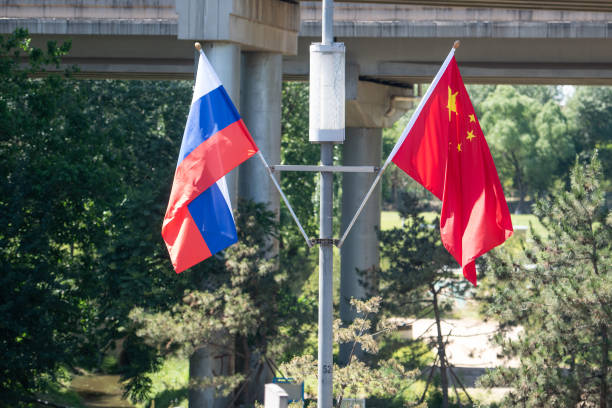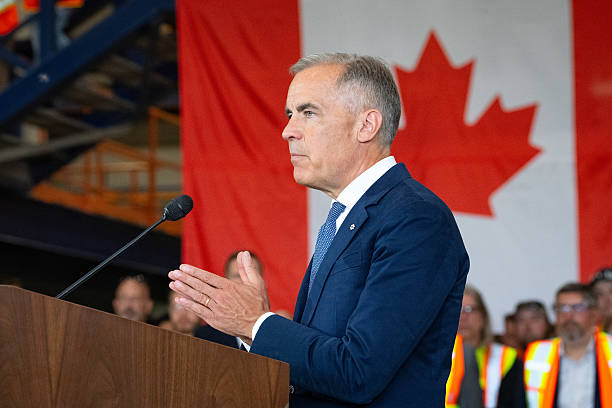U.S.-China Trade Talks Continue Amid Standoff Over Beijing’s Oil Imports from Iran and Russia
U.S.-China trade talks progress but remain stalled over Washington’s demand that Beijing stop importing oil from Iran and Russia, which China rejects as a threat to its sovereignty and energy security.
 Russian President Vladimir Putin Visits China
Russian President Vladimir Putin Visits ChinaU.S. and Chinese officials are making progress toward a potential trade agreement to avert steep tariffs, but significant disagreement remains over a key U.S. demand: that China stop purchasing oil from Iran and Russia.
Following two days of trade negotiations in Stockholm, China’s Foreign Ministry responded to the U.S. threat of a 100% tariff with a firm statement on X: “China will always ensure its energy supply in ways that serve our national interests. Coercion and pressuring will not achieve anything. China will firmly defend its sovereignty, security and development interests.”

The dispute over oil imports highlights China’s continued resistance to linking trade policy with its foreign energy relationships. It comes as both countries signal willingness to stabilize commercial ties after years of escalating tariffs and trade restrictions. Analysts say Beijing is confident in pushing back against the Trump administration, especially on matters tied to its sovereignty.
U.S. Treasury Secretary Scott Bessent acknowledged the friction but remained optimistic. “The Chinese take their sovereignty very seriously,” Bessent said Thursday. He described Chinese negotiators as “tough,” but added, “I believe that we have the makings of a deal.”
Gabriel Wildau, managing director at consultancy Teneo, expressed doubt that President Donald Trump would enforce the 100% tariff, warning that such a move could undo recent progress and jeopardize a potential agreement between Trump and Chinese President Xi Jinping.
The U.S. aim in pressuring China to halt oil imports from Russia and Iran is to cut off revenue that fuels Moscow’s war against Ukraine and Tehran’s support for militant groups in the Middle East. Trump’s broader tariff plan, unveiled in April, targeted dozens of countries, but only China retaliated.
“If the U.S. is bent on imposing tariffs, China will fight to the end,” said Tu Xinquan, director of the China Institute for WTO Studies in Beijing. Tu added that China may doubt Washington’s resolve to follow through, given inconsistencies in U.S. foreign policy on Russia and Iran.
Scott Kennedy of the Center for Strategic and International Studies said Beijing sees its support for Moscow as consistent and may be using the oil issue as a bargaining chip. Danny Russel of the Asia Society Policy Institute said Beijing now views itself as “holding the cards” in negotiations, with Trump eager for a “headline-grabbing deal” that won’t likely be derailed by rejection of the oil demand.
“Beijing simply can’t afford to walk away from the oil from Russia and Iran,” Russel said. He noted that China buys oil at “fire-sale prices,” making it a key strategic supply.
A 2024 U.S. Energy Information Administration report estimated that 80–90% of Iran’s oil exports are shipped to China, which imports over 1 million barrels of Iranian oil daily. China is also the second-largest buyer of Russian seaborne crude oil after India. In April, its imports rose 20% from the previous month to over 1.3 million barrels per day, according to the KSE Institute.
China opposed the Iranian parliament’s threat in June to close the Strait of Hormuz following U.S. strikes on Iranian nuclear facilities, underscoring its reliance on the transit route.
Trump also announced a 25% tariff on Indian goods last week, with an additional tax for India’s continued purchase of Russian oil. India’s Foreign Ministry responded that its relationship with Russia remains “steady and time-tested.” White House deputy chief of staff Stephen Miller said it was “not acceptable” for India to finance the Ukraine war through energy imports from Russia. “People will be shocked to learn that India is basically tied with China in purchasing Russian oil,” he said.
Meanwhile, Senator Lindsey Graham of South Carolina has introduced legislation authorizing the president to impose tariffs up to 500% on Russia and any country knowingly purchasing its energy products. The bill, which has 84 co-sponsors in the Senate and bipartisan support in the House, remains on hold pending Trump’s direction.
“The purpose of this legislation is to break the cycle of China — a communist dictatorship — buying oil below market price from Putin’s Russia,” Graham said in a June statement.
















Conversation